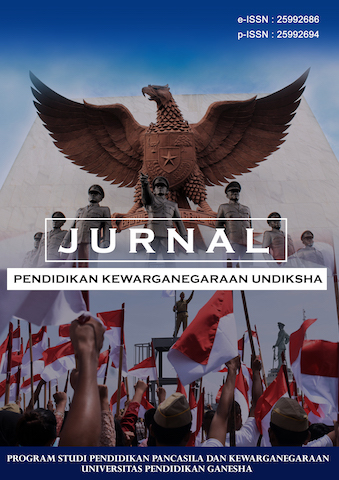TANGGUNG JAWAB NOTARIS/PPAT TERHADAP KREDIT FIKTIF DI BANK
Keywords:
Notaris, Perbankan, Perjanjian Kredit, Kredit fiktifAbstract
Banking is one of the financial institutions with one of its business activities, namely channeling credit to its customers. In the procurement of credit in banks, several problems can be found, one of them is the case of fictitious credit that has dragged Notary / PPAT. Notary / PPAT as an authorized public official to make authentic deeds where in the administration of credit at the Bank, the Notary makes a Deed of Credit Agreement and / or Power of Attorney Encumbering Mortgage Rights (SKMHT) and the Land Deed Official (PPAT) makes a Deed of Encumbrance of Mortgage Rights (APHT). The fundamental issue that will be discussed by the author is how the Notary / PPAT's responsibility for fictitious credit at the Bank. The research method used is normative research with references sourced from books, literature, laws and regulations, journals, and internet. The result of the author's research is that the cause of fictitious credit cases are caused by several factors, and the author's focus is on the factor of falsification and misuse of identity by the debtor and internal parties from the bank by using data from other customers to bind credit and issuing covernotes by Notary / PPAT that are different from the facts that occur. For this case, the author examines how the responsibility of the Notary / PPAT in fictitious credit for the authentic deed issued and the protection of bank customers who are harmed.
References
Buku:
Amirudin dan H. Zainal Asikin, 2016, Pengantar Metode Penelitian Hukum Edisi Revisi, Jakarta: PT RajaGrafindo.
Artadi, I Ketut & Dewa Nyoman Rai Asmara Putra. 2014, Impelementasi Ketentuan-Ketentuan Hukum Perjanjian Kedalam Perancangan Kontrak, Denpasar: Udayana University Press.
Ferry N. Idroes, 2008, Manajemen Risiko Perbankan: Pemahaman Pendekatan 3 Pilar Kesepakatan Besel II Terkait Aplikasi Regulasi dan Pelaksanaannya di Indonesia, Jakarta: Rajawali Press.
Hay, Marhais Abdul, 1975, Hukum Perbankan di Indonesia. Bandung: Pradyna Paramita.
Johannes Ibrahim Kosasih dan Hassanain Haykal, 2021, Kasus Hukum Notaris di Bidang Kredit Perbankan, Jakarta: Sinar Grafika.
Kie, Tan Thong, 1994, Studi Notariat Serba-Serbi Praktik Notaris, Jakarta: Ichtiar Baru Van Hoeve.
Munir Fuady, 2002, Perbuatan Melawan Hukum, cet.1, Bandung: Citra Aditya Bakti.
Subekti, 2010, Hukum Perjanjian, Jakarta: Intermasa.
Suseno, Franz Magnis, 1987, Etika Dasar, Masalah Pokok Filsafat Moral. Yogyakarta: Kanisius.
Sutan Remy Sjahdeini, 1993, Kebebasan Berkontrak dan Perlindungan yang Seimbang Bagi Para Pihak dalam Perjanjian Kredit Bank, Jakarta: Institut Bankir Indonesia.
Trisadini P. Usanti dan Abd. Shomad, 2020, Hukum Perbankan, Jakarta: Prenadamedia Group.
Jurnal:
Asuan dan Susi Yanuarsi, “Kontribusi Jabatan Notaris dalam Perjanjian Kredit Bank”, Fakultas Hukum Universitas Palembang, Volume 20, Nomor 3, September 2022.
Davit R. Kaawoan, “Tanggung Jawab Notaris dalam Membuat Perjanjian Kredit Bank Menurut Ketentuan UU No. 30 Tahun 2004 jo UU No. 2 Tahun 2014”, Lex Privatum, Volume VI, Nomor 7, September 2018.
Dicky Irfandi, Mohamad Fajri Mekka Putra, Siti Hajati Hoesin, “Tanggung Jawab Notaris dalam Pembuatan Cover Note Berkaitan dengan Perjanjian Kredit (Studi Kasus Cover Note No: 209/Sk-Nf/Xii/2013 Dibuat oleh Notaris FMO di Cikarang, Bekasi)”, Garuda, Volume 1, Nomor 1, 2019.
Muktar Muktar dan Amir Machmud, “Tanggung Gugat Notaris Atas Kelalaian Dalam Membuat Akta Perjanjian Kredit Bank”, Jurnal Justice Aswaja, Volume 1, Nomor 1, Juni 2022.
Rahmiah Kadir, Farida Patittingi, Nurfaidah Said, Muhammad Ilham Arisaputra, “Pertanggungjawaban Notaris pada Penerbitan Covernote”, Volume 31, Nomor 2, Juni 2019.
Ryno Bagas Prahardika dan Endang Sri Kawuryan, “Tanggung Gugat Notaris Atas Kelalaian Dalam Membuat Akta Perjanjian Kredit Bank”, Jurnal Transparansi Hukum, Volume 1, Nomor 1, Januari 2018.
Sania Salamah dan Agung Iriantoro, “Prinsip Kehati-Hatian Dan Tanggungjawab Notaris Dalam Membuat Akta Berdasarkan Pasal 16 Ayat (1) Huruf A Undang-Undang Jabatan Notaris (Studi Kasus Putusan Nomor 457 Pk/Pdt/2019)”, Imanot: Jurnal Kemahasiswaan Hukum & Kenotariatan, Volume 1, Nomor 02, Juni 2022.
Hermansyah, “Perwujudan Asas Kepercayaan dalam Pengaturan Kegiatan Usaha Bank”, Nestor Tanjungpura Journal of Law, Volume 11, Nomor 2, 2015.
Ni Luh Wayan Korin Agustini, Cok Istri Anom Pemayun, Dewa Gede Rudy, “Pertanggungjawaban Bank Terhadap Nasabah yang Identitasnya Dipakai Tanpa Izin dalam Kredit Fiktif”, Kertha Semaya, Volume 5, Nomor 1, 2017.
Internet/ Media Online :
Fitri N. Heriani, “7 Hal yang Sering Menyeret Notaris ke Pusaran Kasus”, https://www.hukumonline.com/berita/a/7-hal-yang-sering-menyeret-Notaris-ke-pusaran-kasus-lt573298b2a4142/, (diakses pada tanggal 28 Maret 2023 pukul 19.14 WIB)
Peraturan Perundang-undangan:
Kitab Undang-Undang Hukum Perdata (KUH Per)
Kitab Undang-Undang Hukum Pidana (KUHP)
Undang-Undang Nomor 7 Tahun 1992 tentang Perbankan
Undang-Undang Nomor 10 Tahun 1998 tentang Perubahan Atas Undang-Undang Nomor 7 Tahun 1992 tentang Perbankan
Undang-Undang Nomor 8 Tahun 1999 tentang Perlindungan Konsumen
Undang-Undang Nomor 20 Tahun 2001 tentang Perubahan Atas Undang-Undang Nomor 31 Tahun 1999 tentang Pemberantasan Tindak Pidana Korupsi
Undang-Undang Nomor 30 Tahun 2004 tentang Jabatan Notaris
Undang-Undang Nomor 2 Tahun 2014 tentang Perubahan Atas Undang-Undang Nomor 30 Tahun 2003 tentang Jabatan Notaris
Downloads
Published
Issue
Section
License

This work is licensed under a Creative Commons Attribution-ShareAlike 4.0 International License.
Authors who publish with the Jurnal Pendidikan Kewarganegaraan Undiksha agree to the following terms:
- Authors retain copyright and grant the journal the right of first publication with the work simultaneously licensed under a Creative Commons Attribution License (CC BY-SA 4.0) that allows others to share the work with an acknowledgment of the work's authorship and initial publication in this journal.
- Authors are able to enter into separate, additional contractual arrangements for the non-exclusive distribution of the journal's published version of the work (e.g., post it to an institutional repository or publish it in a book), with an acknowledgment of its initial publication in this journal.
- Authors are permitted and encouraged to post their work online (e.g., in institutional repositories or on their website) prior to and during the submission process, as it can lead to productive exchanges, as well as earlier and greater citation of published work. (See The Effect of Open Access)










